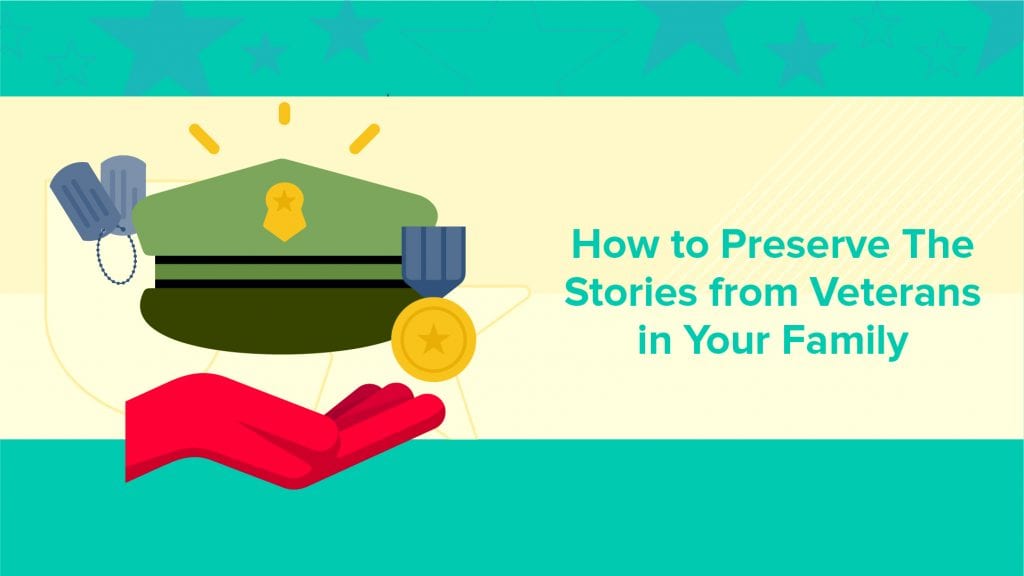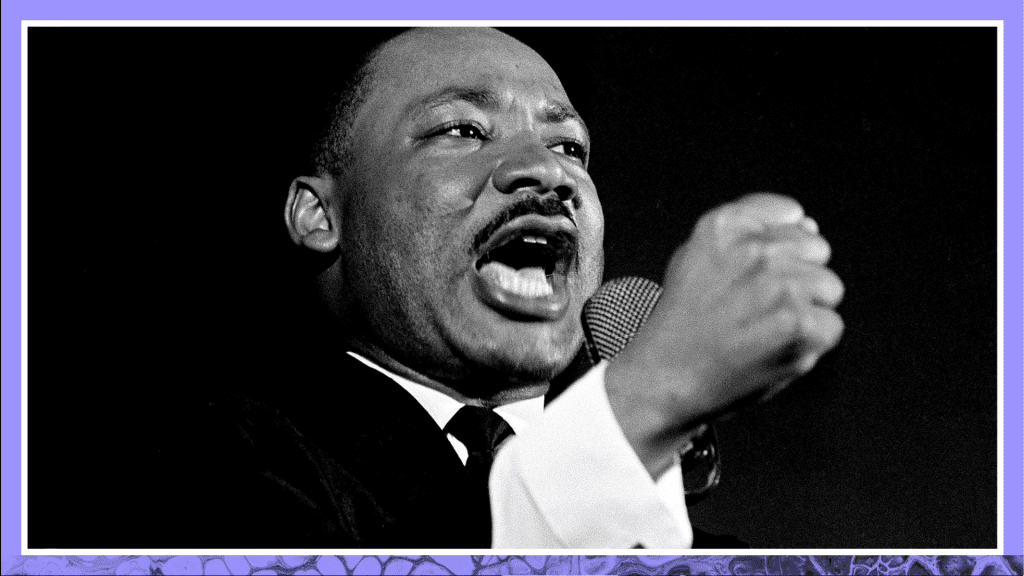How to Preserve the Stories from Veterans in Your Family
Preserving veteran stories satisfies not just our human urge for storytelling, it acknowledges the sacrifices made to gain the freedoms we enjoy today.

National Military Appreciation Month started in 1999, with the late Senator John McCain designating the month of May as the NMAC, through formal legislation. The goal was to remember and honor soldiers and members of the military, acknowledge their hard work and sacrifices, and help people understand military history.
This legislation also prompted the President to issue a statement and order people of the United States to observe Military Appreciation Month. The month of May was selected because a lot of May dates were already dedicated to US Military achievements and acknowledgments.
During this month, members of the military are urged to participate in social engagements to help bring awareness and attention to themselves and their contributions in protecting and defending peace and liberty. This raising of awareness plays an instrumental role in gathering support from the public.
Why Bother Preserving Veteran Stories?
Good question. It’s important for humanity to learn from history, whether it’s good, bad, or downright ugly. Those who forsake history or try to rewrite or gloss over it, unfortunately, are doomed to repeat it. We, humans, are a fickle species and need reminders of what war and oppression truly look like, to stay the course and fight the good fight of freedom and liberty for all.
We’re Storytellers at Heart and Veterans Have Stories to Share!
Storytelling and tales of might have always been a part of culture and traditions for millennia, no matter what continent you hail from. By collecting and preserving the stories of our veterans, it satisfies not just our very human urge for storytelling, it also helps us acknowledge and remember the many sacrifices made by others to gain the freedoms we enjoy here in America today.
More importantly, preserving veteran stories is an excellent way of showing our support and appreciation for all that our veterans have done, and all that the military is still doing and sacrificing, all over the world.
Often, hearing wartime stories directly from their source––instead of reading them in books or newspapers––can shed a whole new light on history. Merely reading about war can feel a bit removed, like you’re reading fantasy and not reality.
However, hearing from the people in your life––straight from the horse’s mouth, so to speak––who experienced war first-hand and risked their own physical and mental health for the sake of others, makes you better appreciate the weight and implications these events had in our history.
It’s a Collection and Preservation of Oral Histories
Oral histories and traditions are often passed down for generations. They tell more than just the dates and places of service, they bring to life the details.
Think about when you imagine ‘the military’. It can seem like a body of faceless and nameless members, without little to no human connection. This can cause a bit of a dissociation from reality. It’s viewed more as an ‘entity’ instead of a body of real people who were part of very real situations.
By hearing history from the veterans who experienced it in living color, it not only makes those experiences all the more real, it enhances their stories. Those stories are no longer just dates and names in a history book, but the lives of a group of living, breathing humans and the valiant actions they took on behalf of freedom and country.
It’s a Collection and Preservation of Family Legacies
Hearing wartime stories from members of your family also puts your family history into perspective. It ensures that their stories and legacies are not forgotten, and that future generations in your family will be able to recognize and acknowledge the sacrifices of their ancestors.
Here at Rev, we feel it’s important to honor our veterans and all that they’ve done for our country. We want to make sure their stories will not be forgotten! Keep reading for some tips on how you can help contribute to preserving veteran stories along with us.
Prepping to Interview Your Veteran
Before any interview, it’s best to be prepared. You should know the general direction you want your interview session to take, as well as any specific topics you want to address. It’s a good idea to compile a list of potential questions to ensure your interview goes smoothly.
However, there is some etiquette that should be followed when interviewing a veteran. The first and most important rule to remember is always treat your veterans as fellow humans, and not merely an object to glean information from.
Be sure to extend the same level of kindness and respect to them as you would want for yourself. Go out of your way to make them feel appreciated and acknowledged during your interview, as opposed to feeling interrogated.
Conducting a Pre-Interview Call
A pre-interview call allows both the interviewer and interviewee time to become familiar with each other, as well time to decide a theme for the interview, if you have one in mind. During the pre-interview, you can use that time to obtain basic information about your veteran. These details might include:
- Duration of their service
- Their rank
- What unit they served in
- Places they’ve been deployed to
- Duties and responsibilities associated with their rank
This time also allows you to narrow down the focus of the interview, and design your questions to help prompt discussion on those topics. It will give you an idea of what might be sore subjects that your veteran may not want to discuss.
Good Veteran Interview Questions
The questions you ask can make or break an interview. Below are ideas for potential questions to consider posing to your veteran during your interview. Good questions to ask might include:
What Motivated You to Join the Military?
This is a great way to kick off an interview. Their answer will shed some light on their background and what prompted them to join the military in the first place. It’s a simple question designed to put your veteran at ease, so they are more willing to open up and share their story.
What Rank/Service are You Most Proud Of?
This is a question that will help veterans remember the good parts about their service, and allow them to express pride in their accomplishments in the military without guilt or revisiting trauma. They can share about the training they underwent that lead them to winning any medals or honors during their career.
What’s a Funny Story from Your Time in the Military?
It’s always good to include a light-hearted question like this one that allows veterans to reminisce about the good times during boot camp, pranks on fellow soldiers, tough training bloopers, or other times they had fun during their service.
Would You Like to Share Some War Stories?
Once you’ve created a rapport with the above questions, you can move on to the meat of the interview. This question will help prompt them to begin talking about what it was like during wartimes and being a soldier. If you know of any battles they were a part of, you can ask about those specifically.
How Do Your Military Experiences Affect Your Life Today?
This is a good question that can help guide the interview toward its conclusion. Veterans can share any life lessons learned during their service, how it has made their lives better or worse, or even how life has changed in the present day. They can also share any difficulties they’ve face due to their military experiences, like PTSD or biases from other people, provided they’re comfortable doing so.
Bad Veteran Interview Questions
The reality is there are some things you probably should not say to a veteran. Some of those questions and statements might include:
How Could You Leave Your Family for So Long?
Ouch. Not saying you can’t ask something along those lines, but phrase it better. Perhaps more as a statement like, “I’m sure it was difficult to leave your family for long periods of time. Could you share about that?”
The truth is that veterans perform their duties while compromising on their family and social lives. It’s not a small sacrifice by any means. However, that does not mean they abandoned their family to serve in the military.
Questioning their choice to serve is poor form. Regardless of why they enlisted, their actions contributed to keeping those you know and love safe and in control of their own freedoms. Guilting or shaming a veteran about leaving their family while on deployment is a huge no-no.
How Many People Have You Killed?
Unless it’s your goal to be rude, don’t ask this one! This is an incredibly offensive and prying question, and it’s an invasion of privacy. Taking a life is a traumatic event for many people in the military, just like it would be for you as a civilian.
The fact that you would even ask this question shows the veteran how little you respect them as human beings. Not only can it disturbing to be asked this, it can also trigger PTSD. The goal is stories for posterity, not prying to cause harm.
Did Anyone You Know Die ‘Over There’?
The reality is that soldiers risk their lives every day in the field, which means that people do die during their service. However, depending on the circumstances of the death, it can be traumatizing and extremely upsetting for veterans to reminisce about it.
Death is disturbing enough. Moreso when it’s an unexpected and violent death, like what happens during war. And just like it’s difficult to talk about the death of a friend, family, or acquaintance, it’s also difficult for veterans to talk about the deaths of their brothers and sisters in arms. Such questions can bring up horrific memories and be detrimental to their health and peace of mind. Now that’s not to say you can’t wait and see if they bring it up themselves, but if they don’t, it’s prudent to skip this question.
Do You Feel Guilt About Your Actions?
Among veterans, there are many who may feel conflicted about their actions, and guilty over some parts of their job. Violence can make anyone feel conflicted about the need of it, and it can cause them to question their choices.
However, many veterans also understand the importance of their service, however difficult it may have been. Since you don’t know which school of thought they belong to, it’s best to skip this question. If they don’t feel any guilt, it can seem offensive and appear to suggest they should feel that way. If they do feel guilt, it’s better not to remind them of it in the first place.
You Seem Normal…
Joining the military is similar to joining any other field. It is normal for most of society. The statement ‘you seem normal’ can be the wrong thing to say for two reasons. First, maybe your veteran struggles with PTSD, feeling guilty, or being upset over some of the things they did or saw during deployment.
Saying ‘you seem normal’ when they’re struggling with issues can be both invalidating and belittling of their feelings. Second, perhaps your veteran feels no guilt or trauma from their years in service. In that case, saying ‘you seem normal’ can be alienating, since they don’t feel their job or actions were abnormal in any way.
You Signed Up for This…
While it’s true that veterans enlist and sign up to be in the military, and obviously that means they sign up for whatever they’ll be required to do, it doesn’t mean they aren’t affected by that decision.
The life of a soldier during deployment is extremely tough, and it makes a mark on even the most hardened of people. Diminishing and invalidating their struggles with a flippant ‘you signed up for this’, can be both dismissive and hurtful. Not exactly the best material for an interview!
I Know How You Feel…
The truth is, unless you are a veteran yourself and served on deployment, you really don’t know how they feel. In fact, this advice is applicable to any situation in life. Statements like this can make it tough for veterans to share their experiences, which annihilates your goal of getting a great interview. It also makes it feel as though you are prioritizing your story and experiences over theirs. In reality, your story is simply not comparable.
I Don’t Agree with What You Did There…
Hopefully, if you’re interviewing veterans to capture their stories, you hold the opinion that they are an important and honorable sect of our society. However, even if you hold opposing political beliefs and don’t agree with the actions of the military, there is no reason to say so during your interview.
Remember that the aim of your interview is to honor veterans, not shame them. The veterans you interview are not responsible for military or government policies. They were simply soldiers serving their country, and it’s hurtful to attack their service to the country over dissenting political views.
Tools Needed for Conducting a Successful Interview
Good tools are necessary to conduct a great interview. Some of those tools might include a microphone, camera, and laptop, an old-fashioned notebook and pen, or even a hand-held recorder. It really depends on the type of interview you conduct.
Though we could be biased, for in-person interviews, our Rev Voice Recorder is an excellent choice for quality recording.
However, if you plan on doing most of your interviewing via phone calls, our Rev Call Recorder is also a wonderful choice. Not to mention it’s exceptionally convenient for doing long-distance interviews when you’re unable to travel.
Transcribing Your Interview
Once an interview is complete, you can transcribe the audio or video into text for both better understanding and additional preservation. Transcribed interviews can be converted into multiple mediums, like news articles, blog content, book compilations, and so much more.
The process of transcription is fairly straightforward and only requires a couple of tools to be done properly. If you’re feeling stuck, consider the tools provided by us here at Rev and simply upload your audio or video file and we’ll do the heavy lifting.
Optional Things to Include with Your Veteran Stories
Sometimes veterans keep mementos and artifacts that mean something to them. It’s a great idea to include some of those things in your stories, if at all possible. For instance:
- Old letters between themselves and loved ones they may have kept
- Old journals that share their thoughts during their deployment
- Photographs related to their time of service and story
- Memoirs and personal accounts they may have written
- 2-D artwork or other artifacts related to their service
Ways to Share Your Veteran Stories
There are a lot of ways to share veteran accounts, such as creating a blog or them sharing on social media sites. Podcasts and video interviews are also quite popular, so it really just depends on you! Just be sure to enhance your stories with photographs of your veterans, both from their time in the military and after. Always remember that the best stories have real people behind them, with real faces.
Interviewing veterans is a beautiful way to capture and share their stories of bravery with others, both for the sake of posterity and remembrance, and also as a way to honor the contributions they’ve made to life, freedom, and country.













